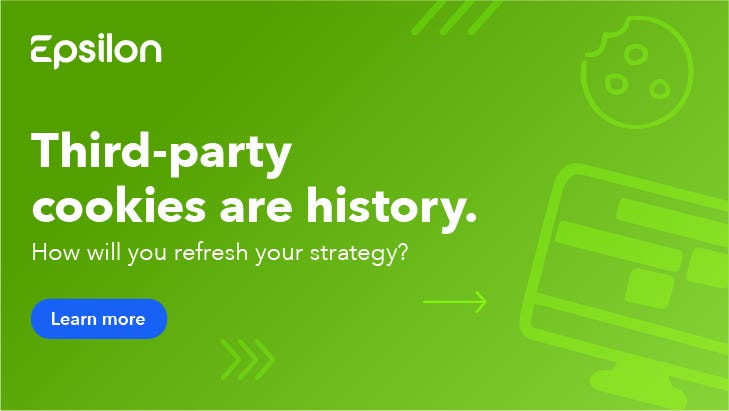The Greatest Country In the World Doesn't Understand the Internet
Also - a Newfront question - better to be an aggregator or a producer?
We’ve seem some recent examples of why, as great as the United States of America is, having a republic made up of 50 individually-run states can present more of a problem than a good thing. Such as:
The electoral college
Covid response
What to call soda
Regulating digital advertising
At the risk of repeating myself, how lame/slightly pathetic is it that the richest, most innovative, technology-rich nation on earth is sitting back and waiting for a pair of British regulators to decide how the internet works (this is not an indictment of the British, or British regulators, both of whom are wonderful). Meanwhile, as Google delays cookies again, our legislators and governing bodies just sit there, and maybe worry about whether Yelp got screwed in search results many years ago.
We do have several states that have enacted digital privacy legislation, including California, Colorado, Utah and Connecticut. Raise your hand if you’ve noticed any impact from these laws
However, these states are “going to start enforcing,” said Lartease Tiffith, the IAB’s EVP for Public Policy, who joined my podcast this week. Tiffith said over the next couple of years, half the states in the union should have laws - some aimed at protecting consumers’ data, or kids, or location data, or some variation or combination of all three.
This half-the-states-doing-their-own-thing situation hardly seems an ideal way to govern a multibillion industry.
“The patchwork is not helpful,” Tiffith said. “It’s very hard, particularly for small companies. And it’s challenging for consumers.”
Well, at least we have the Federal Trade Commission, a centralized, unified body led by a tech savvy chairman in Lina Kahn, which is going after Big Tech.
However, the IAB - which to be fair, has a paying membership body that includes Google, Meta, Amazon and many other Silicon Valley giants - really thinks the Khan and company don’t get it.
“I have some real concerns with the FTC,” he said. “I think there is a hostility toward the advertising industry.” The continued use of the term “commercial surveillance” is “concerning.”
Tiffith added that in his mind, the FTC’s view is that the internet is really just a big fat triopoly, and those giants abuse their power among businesses and consumers. Which if true, makes it all the more puzzling as to why the FTC is so silent regarding Google’s Privacy Sandbox.
But maybe the FTC just doesn’t care much about the open web, which Marketecture’s Ari Paparo theorized was “in secular decline.”
Naturally, the IAB doesn’t see it that way.
“At the end of the day, digital advertising is what is allowing for so much great content and services,” Tiffith said “[The FTC’s] approach is truly problematic. There is a bit of a not caring about the role digital advertising players, and really focusing on what gets them headlines.”
In the meantime, the ad world will likely just wait for the Europeans to tell us how to run its business, as the US continues to lead from behind.
I took a spin around a few NewFronts this week - and they strangely reminded me of a piece my old colleague Brian Morrissey wrote for Adweek years ago about whether it was better to be an aggregator (like a portal) or a web publisher/creator (like say Forbes.com).
I can’t find this piece in the archives, but it was focused on a long ago debate about whether those who were producing traditional journalism were getting screwed by those who were leading people around the web - i.e. Yahoo, AOL, MSN. Because clearly, at that point, even if they didn’t make much of their own stuff, the portals - with their huge scale - were winning more ads deals. Over time, they were replaced by platforms like Facebook and Google, as things only got worse for publishers.
Why this question might matter today is that there is a much repeated belief that in TV, that those who run the operating systems in CTV will capture the spoils. That seems to be the belief of the big TV manufactures who presented during the NewFronts this week - Samsung, LG and Vizio, as well as device-makers like Roku.
Because in many ways, these companies are the Yahoos of TV. Their home screens are the first stop for millions of viewers, and can serve as massive traffic firehoses for others in the space. Roku’s CEO Charlie Collier even likened Roku’s UI to the classic TV lead-ins of the past - e.g. watch All in the Family and stick around for The Jeffersons. The company claims that its software is on 48% of smart TVs.
Similarly, Samsung boasted that it was the dominant free CTV ad seller in the market, and had devices in three quarters of US homes.
Yet the dynamics of the web portal-versus-publishers era seem to be flipped this time around. To fully contend in TV, you’ve got to have actually TV viewership and ad inventory. And as much as the Samsungs and Rokus present others’ content as sort of their own - most viewers are just passing through. NBCU might have an ‘Olympic Partnership’ with Roku, but if you want to stream the Paris games, you really need to get Peacock.
Which is why Roku - like Yahoo of the past - is trying to build out its own library of originals, while nurturing its free channel. There appears to be a ceiling in being a TV gatekeeper. Yet as we know, fighting the original content battle in streaming is hard enough for Disney and Paramount, let along smaller players.
Similarly, Samsung touted unique content partnerships - like a Formula 1 channel (which didn’t seem to have any actual live sports)- and its growing FAST service Samsung TV Plus, home of the Pickleball Channel. Samsung says that Plus drives “unrivaled engagement” and that time spent on its 2,600 ad-supported channels jumped 60% growth year over year (though it didn’t say from what base, or what the time spent number is today).
“We reach more ad-supported viewers than anyone,” said one Samsung exec. A curious comment given that a)Samsung Ads doesn’t show up in Nielsen’s The Gauge report and b)YouTube and Hulu exist.
I don’t mean to pick on any one of these companies. There is arguably a growing credibility problem across the FAST space, given how much data is self-reported. These TV makers and device manufacturers may end up proving to be the new titans of the ad industry - but I wonder if we’ll ever see the same patterns that played out on the web - where platforms ruled distribution, and brands eventually pivoted to audience-based buying over direct deals with publishers.
Today, owning the content and viewership experience in TV still rules. Which is why Amazon can just ‘turn on ads’ and fall into a multi-billion business overnight.





Charlie is not the CEO of Roku.